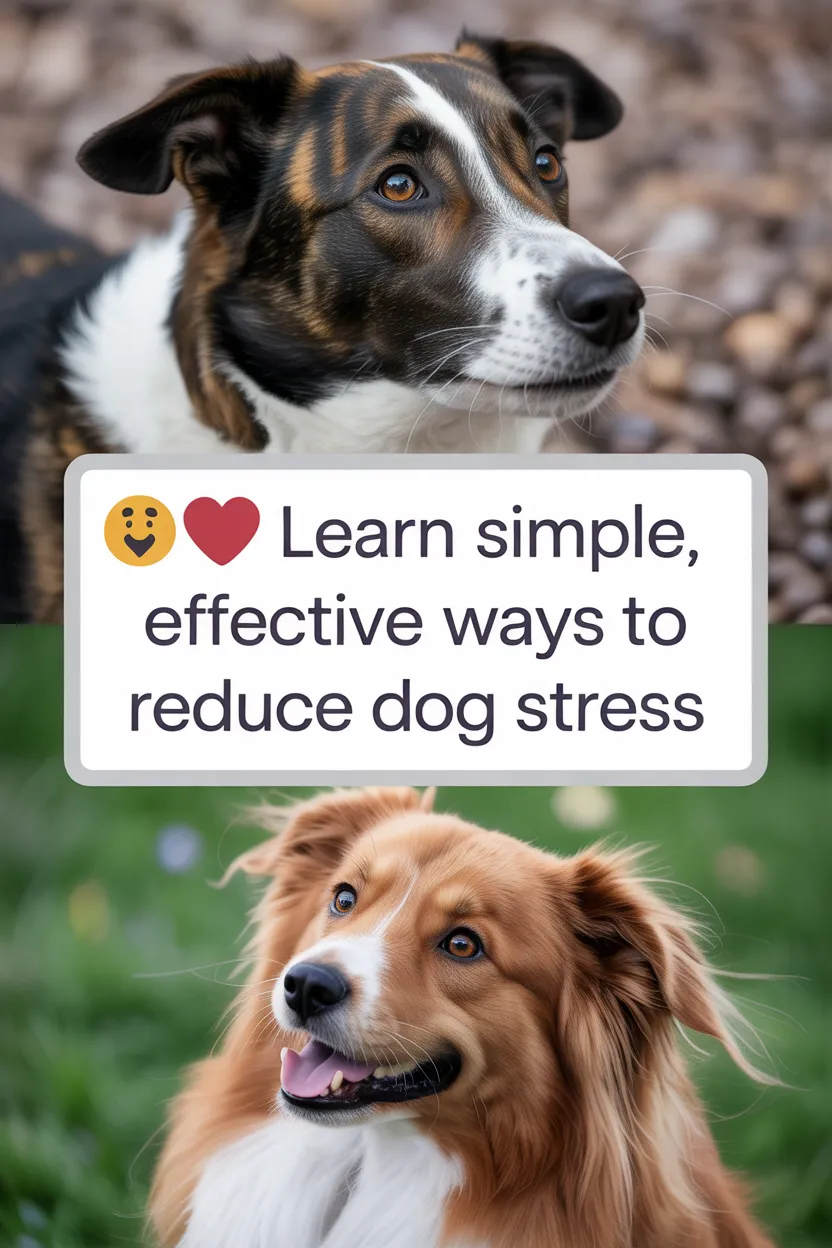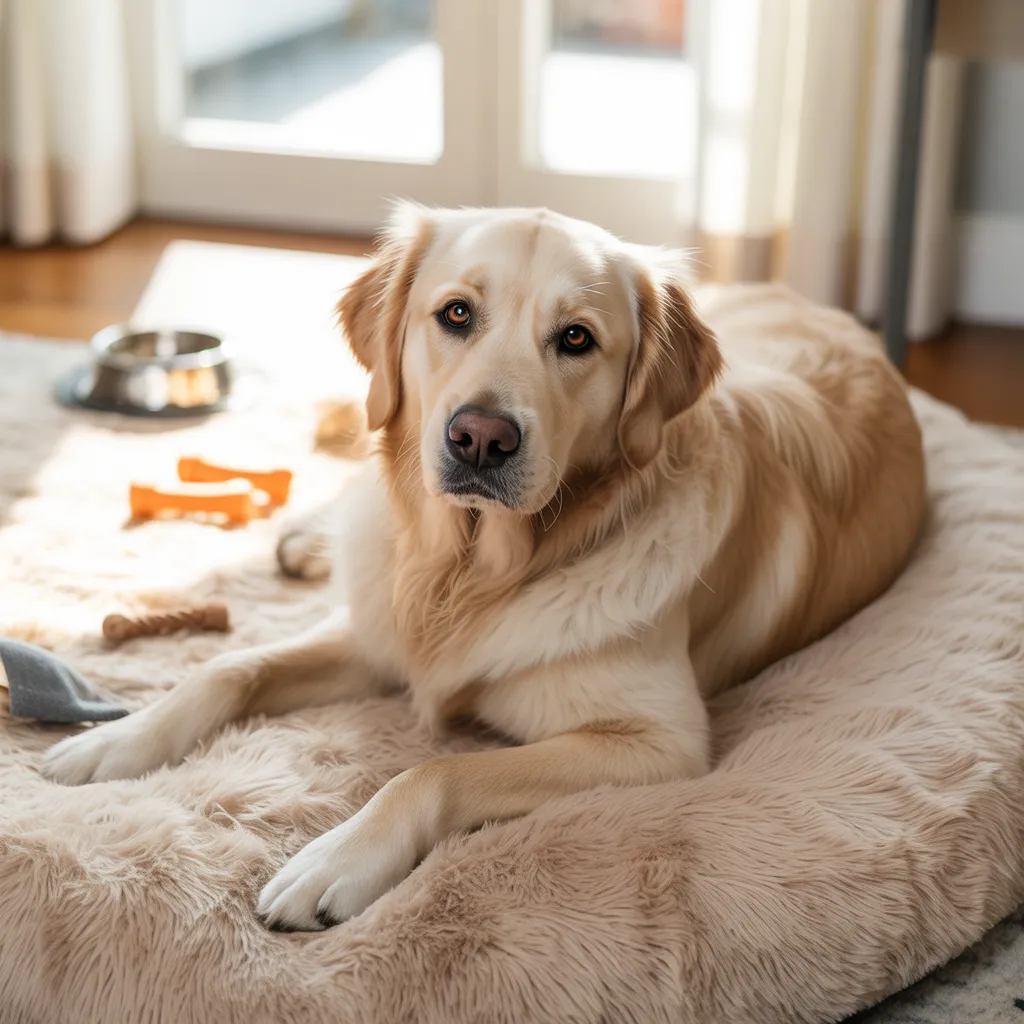Reduce Dog Stress: A Loving Guide to Calmer, Happier Pups

As dog parents, we know our pups aren’t just pets — they’re family. And just like us, dogs can feel stressed or anxious. Loud noises, new environments, separation, or even changes in routine can overwhelm them. The good news is, with the right care, you can reduce dog stress and bring peace back into their lives.
I know how heartbreaking it is to see your dog pacing, trembling, or hiding. But with patience and love, there are plenty of ways to comfort them and help them feel safe again.

1. Recognize the Signs of Stress in Dogs
Before you can reduce dog stress, you need to know what it looks like. Dogs show stress in different ways:
- Excessive panting or drooling
- Pacing or restlessness
- Trembling or hiding
- Destructive behavior when left alone
- Excessive barking or whining
- Loss of appetite
If you notice these signs, your pup is trying to tell you they need comfort and calm.
2. Create a Safe Space
Just like humans need a quiet retreat, dogs benefit from a safe space where they can relax.
- Use a crate or cozy corner with blankets and favorite toys.
- Keep it quiet, away from loud noises or busy areas.
- Encourage your pup to retreat there when feeling overwhelmed.
A safe space is one of the simplest yet most effective ways to reduce dog stress.
3. Stick to a Routine
Dogs thrive on consistency. Predictable meal times, walks, and play sessions provide comfort. When life feels stable, stress naturally decreases.
Even small changes, like moving feeding times, can confuse or worry your pup. Keeping things consistent helps reduce dog stress by building trust and security.

4. Exercise and Play
A tired dog is a happy dog. Physical activity helps release pent-up energy and lowers anxiety.
- Daily walks or runs
- Fetch or tug-of-war
- Puzzle toys to stimulate their minds
These activities not only keep your dog fit but also help reduce dog stress by burning off nervous energy.
5. Calming Techniques
Sometimes your dog just needs extra soothing. Gentle, natural methods can make a big difference:
- Massage or gentle petting to release tension
- Calming music designed for dogs
- Aromatherapy with dog-safe scents like lavender (always check safety first)
These techniques work wonders to relax your pup and reduce dog stress in everyday life.
6. Positive Reinforcement
When your dog handles a stressful situation calmly, reward them with treats or praise. Over time, this teaches them to associate stressful triggers with positive experiences.
This method not only helps reduce dog stress but also strengthens the bond between you and your pup.
7. When to Seek Professional Help
If your dog’s stress is severe or persistent, don’t hesitate to consult a vet or professional trainer. Sometimes underlying health conditions, separation anxiety, or trauma require specialized care.
Your pup deserves comfort and happiness — and sometimes professional guidance is the best way to get there.
Final Thoughts
Seeing your furry friend struggle with stress can be heartbreaking. But by learning how to reduce dog stress, you’re giving them the gift of calm, safety, and love.
Whether it’s through exercise, a cozy retreat, or simply being by their side, your presence and care mean more than anything. Because at the end of the day, your dog doesn’t just need solutions — they need you. 🐶❤️As dog parents, we know our pups aren’t just pets — they’re family. And just like us, dogs can feel stressed or anxious. Loud noises, new environments, separation, or even changes in routine can overwhelm them. The good news is, with the right care, you can reduce dog stress and bring peace back into their lives.
I know how heartbreaking it is to see your dog pacing, trembling, or hiding. But with patience and love, there are plenty of ways to comfort them and help them feel safe again.
1. Recognize the Signs of Stress in Dogs
Before you can reduce dog stress, you need to know what it looks like. Dogs show stress in different ways:
- Excessive panting or drooling
- Pacing or restlessness
- Trembling or hiding
- Destructive behavior when left alone
- Excessive barking or whining
- Loss of appetite
If you notice these signs, your pup is trying to tell you they need comfort and calm.
2. Create a Safe Space
Just like humans need a quiet retreat, dogs benefit from a safe space where they can relax.
- Use a crate or cozy corner with blankets and favorite toys.
- Keep it quiet, away from loud noises or busy areas.
- Encourage your pup to retreat there when feeling overwhelmed.
A safe space is one of the simplest yet most effective ways to reduce dog stress.
3. Stick to a Routine
Dogs thrive on consistency. Predictable meal times, walks, and play sessions provide comfort. When life feels stable, stress naturally decreases.
Even small changes, like moving feeding times, can confuse or worry your pup. Keeping things consistent helps reduce dog stress by building trust and security.
4. Exercise and Play
A tired dog is a happy dog. Physical activity helps release pent-up energy and lowers anxiety.
- Daily walks or runs
- Fetch or tug-of-war
- Puzzle toys to stimulate their minds
These activities not only keep your dog fit but also help reduce dog stress by burning off nervous energy.
5. Calming Techniques
Sometimes your dog just needs extra soothing. Gentle, natural methods can make a big difference:
- Massage or gentle petting to release tension
- Calming music designed for dogs
- Aromatherapy with dog-safe scents like lavender (always check safety first)
These techniques work wonders to relax your pup and reduce dog stress in everyday life.
6. Positive Reinforcement
When your dog handles a stressful situation calmly, reward them with treats or praise. Over time, this teaches them to associate stressful triggers with positive experiences.
This method not only helps reduce dog stress but also strengthens the bond between you and your pup.

7. When to Seek Professional Help
If your dog’s stress is severe or persistent, don’t hesitate to consult a vet or professional trainer. Sometimes underlying health conditions, separation anxiety, or trauma require specialized care.
Your pup deserves comfort and happiness — and sometimes professional guidance is the best way to get there.
Final Thoughts
Seeing your furry friend struggle with stress can be heartbreaking. But by learning how to reduce dog stress, you’re giving them the gift of calm, safety, and love.
Whether it’s through exercise, a cozy retreat, or simply being by their side, your presence and care mean more than anything. Because at the end of the day, your dog doesn’t just need solutions — they need you. 🐶❤️






